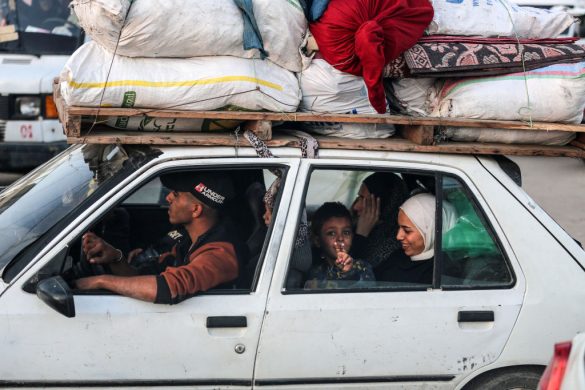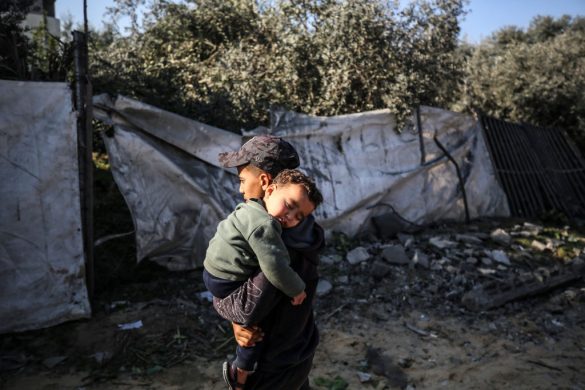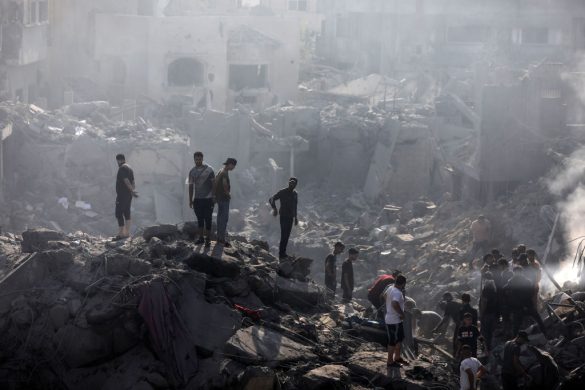Yezidi-minoriteten flygter i stort antal fra Den Islamiske Stats fremrykning i det nordlige Irak. Mange af dem er dybt traumatiserede på grund af grusomme oplevelser, de har haft i Irak, siger frivillig svensk læge.
SILOPI, TURKEY, 18 August 2014 (IRIN): As soon as he crossed the border into southeastern Turkey, Khudeda Khalaf downed a bottle of water and called his aunt’s cell phone, praying that she and her family had made it to safety.
“But the voice that answered spoke in Arabic,” the 41-year-old, said, confirming his worst fears that his relatives had been abducted by members of the Islamic State (IS), a jihadist movement formerly known as ISIS.
He speaks Kurmanji, language of Iraqi Kurds including the Yezidis.
“We still don’t know if they’re dead or alive,” he said.
“And now all we can do is wait,” said Khalaf, one of an estimated 200,000 Yezidis who in the past two weeks have fled their homes around the town of Sinjar in northern Iraq to escape the IS advance, and one of 2,000 who have gone to Turkey.
Not tolerated by islamists
Followers of an ancient religion related to the Zoroastrian faith, Yezidis worship a deity called the Peacock Angel, who was supposedly temporarily cast out of heaven by God.
As a result, Yezidis are often branded devil worshippers.
Along with Christians and other non-Sunni Muslims, Yezidis are little tolerated by the hardline Sunni Muslims from IS.
Large numbers of the community, believed to number 500,000 in Iraq, have been killed in recent weeks, according to reports.
“The Yezidi are peaceful people. We don’t hurt anyone,” said Dawd Sulyman, 21, who left his home in Sinjar by car on the morning of 3 August and arrived in Turkey that evening, via the semi-autonomous Kurdistan region.
Sulyman told IRIN how he had woken that morning to discover the Peshmerga, soldiers from Kurdistan who had been holding a front line against IS since their advance into Mosul in early June, had retreated.
No option
At that point, he said he had no choice but to leave. “IS attacked us because they don’t like our religion,” he said.
“They tell us to become Muslims or they will kill us.”
The majority of the displaced Yezidis fled northwards into the Sinjar mountain range where tens of thousands got stuck for several days without food, water or shelter.
Yet others have decided instead to flee Iraq altogether. Sulyman, who travelled with his passport, said he decided to go to Turkey, rather than stop in Kurdistan because it was “one step closer to Europe”.
Residents of Silopi, just inside Turkey, where a reception camp has been set up by the local municipal authorities, have welcomed the new arrivals, who number around 1,600, providing them with food and medical care.
Psychological trauma
Steffan Hasan, a Swedish doctor and himself a Yezidi, had cut short a vacation in Istanbul to volunteer in the camp.
He said most people were suffering from dehydration and there were many cases of “psychological trauma”.
“They don’t speak, they can hardly eat. They have seen horrible things,” he said.
The medic recounted a story he had heard from one of his patients: that two boys who had been on Mt Sinjar had ventured out under the cover of night to fetch food and water for their starving families.
“When the boys didn’t return the next day, people went searching for them and found their bodies,” he recalled. “Their hands and heads had been cut off.”
Hanifa, a mother of two, told IRIN how she fled her village of Khanazour after hearing that armed fighters had executed two men and taken their wives.
“We left everything – our houses, our gold, our money – and we never looked back.”
She said the family would never go back as long as IS remains in control.
“We cannot live in an Islamic region.”
Entry problems
Læs resten af artiklen på IRIN News














